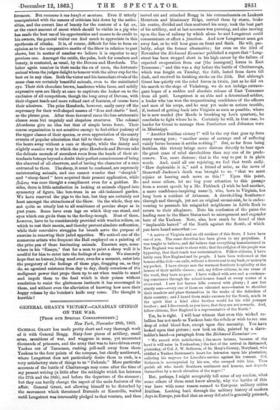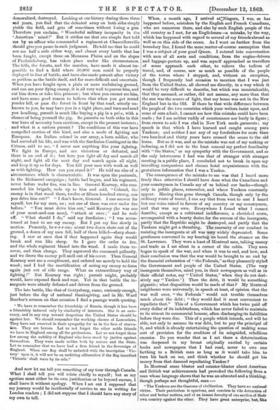GENERAL GRANTS VICTORY—CANADIAN OPINION ON THE WAR.
FROM OUR SPECIAL CORRESPONDENT.]
moved out and attacked Bragg in his entrenchments on Lookout Mountain and Missionary Ridge, carried them by storm, broke his centre, divided and then scattered his army, took the best part of his artillery, and at last accounts was pursuing, and also moving upon the line of railway by which alone he and Longstreet could communicate or effect a junction. And now Longstreet must get away fast, or he will hear guns on front and flank. He will, pro- bably, adopt the former alternative ; for even on the 23rd of November the Richmond Examiner published a report that "Long- street has been stopped short in his high career by the failure of expected co-operation from our [the insurgent] forces in East Tennessee ; " and this was a day before the battle of Chattanooga, which was fought on Tuesday, the 24th, lasted from dawn till dusk, and received its finishing stroke on the 25th. But although Grant has quietly cut the rebel forces in twain, just as he did on his march to the siege of Vicksburg, we do not indulge extrava- gant hopes of a sudden and absolute release of East Tennessee from all peril. Longstreet is an able and a determined soldier, a leader who has won the unquestioning confidence of the officers and men of his corps, and he may yet make us serious trouble, if, instead of getting back into Virginia as soon as possible, where he is now needed (for Meade is breaking up Lee's quarters), he concludes to fight where he is. Certainly he will, in that case, be harder for Grant to manage than Pemberton and Johnston were in Mississippi.
"Another fruitless victory !" will be the cry that goes up from many among you ; "another scene of carnage and of suffering vainly borne because it settles nothing!" But, so far from being fruitless, this victory brings more distress directly to bear upon the great mass of rebel slaveholders than any one of its prede- cessors. Yes, more distress ; that is the way to put it in plain words. And, amid all our rejoicing, we feel that truth sadly. "How deplorable it is," said a friend of mine, as the news of Stonewall Jackson's death was brought to us, "that we must. rejoice at hearing such news as this ! " Upon this point, and some others, let me beg your attention to this passage from a recent speech by a Mr. Fishback (I wish he had another, a more confidence-inspiring name!), who, born in Virginia, has long been a resident of Arkansas. A slaveholding Southerner through and through, yet not an original secessionist, he is endea- vouring to persuade his misguided neighbours in Little Rock to return to their allegiance. Note his confession of the pains the leading men in the Slave States took to misrepresent and engender hate of the Yankees. Note, also, how much he found of that "implacable hatred" of the North against the South, of which you have heard somewhat :—
"A native of Virginia and an old resident of this State, I have been one of you. The same direction has been given to my prejudices. I was taught to believe, and did believe that everything.manufaatured in New England was made to cheat with; that the religion of the people was hypocrisy, that their touch was contamination. Fellow-citizens, I have lately seen New England and its people. I have been welcomed at the houses of the rich—an exile, without a decent coat to my back, or money in my pocket. I have always met the warmest Southern hospitality at the houses of their middle classes ; and, my fellow-citizens, in one sense of the word, they have no poor. I have walked with awe and a condemn- ing conscience through the school-houses found at every corner of a cross-road. I saw her barren hills covered with plenty ; I saw her sturdy sons—every one of them an educated man—hasten to shoulder their muskets and place themselves in the ranks of the defenders of their country ; and I heard them make excuses for the South, much in the spirit that a kind elder brother would for his wild younger brother ; and I discovered, as you have, that they are not cowards. And, fellow-citizens, New England is a representative of the North."
Yes, he is right. I will bear witness that even this wicked re- bellion has not made us Yankees hate the rebels or wish to see one drop of rebel blood flow, except upon dire necessity. You have looked upon that picture ; now look on this, painted by a slave- holder's hand—a paragraph from the Richmond Examiner :—
"We record with satisfaction, ( the more intense, because of the howl it will raise in Yankeedom,) the fact of the arrival in Richmond, yesterday, of Col. T. W. Sotheron, of St. Mary's County, Maryland, who riddled a Yankee lieutenant's heart for intrusion upon his plantation, enlisting his negroes for Lincoln's service against his consent. Col. Sotheron is accompanied by his son, who escaped with him. Thus perish all who insult Southern sentiment and honour, and degrade themselves by a mock elevation of the negro !"
Bat, perhaps, I might acceptably tell some of my readers, what some others of them must know already, why the battles of this war have with some reason seemed. to European military critics fruitless. Looking back through the military history of modern days in Europe, you find that an army defeated is generally pursued, demoralized, destroyed. Looking at our history during these three sad years, you find that the defeated army on both sides simply yields the field, and gets off sometimes without losing a gun.
Therefore you exclaim, "Wonderful military incapacity in the ' American ' mind I" But it strikes me that one simple fact told me by an officer who commanded a regiment at Chancellorsville • should give you pause in such judgment. He told me that he could not see half a mile either way, and almost every battle that has been fought, except those on Manassas Plains and on the slopes of Fredericksburg, has taken place under like circumstances. The hills, the forests, and the marshes, have made it almost im- possible to find a field where 50,000 men could be properly deployed in line of battle, and have also made pursuit after victory as perilous as the battle itself, and far more difficult and uncertain. When you have fought upon a plain or mere undulating ground, and can see your flying enemy, it is all very well to pursue him, and cut him down or take him prisoner ; but when you cannot see him, and have some good reason to believe that when you get round yonder hill, or pass the forest in front by that road, utterly un- known to you, he may have you in a tight place, and turn and send you headlong, pursuit is much like buying a pig in a poke, with a chance of being yourself the pig. So pursuits on both sides in this war have of necessity been cautious, except in the present instance ; and what is a cations pursuit ? The conditions of this war have compelled caution of this kind, and also a mode of fighting not European. An Italian colonel in our army, a born soldier, who had served all his life, and was with the Sardinian Contingent in the Crimea, said to me, "I never saw anything like your fighting. We fight in Europe, and are victorious or defeated, and there is an end of it ; but here you fight all day and march all night, and fight all the next day and march again all night, and keep it up so for days. You kill your men with work as well as with fighting. How can you stand it ?" He told me also of a circumstance which is characteristic. It was upon the peninsula, in the Richmond campaign ; battle had begun, and his regiment, never before under fire, was in line. General Kearney, who com- manded his brigade, rode up to him and said, "Colonel, the enemy is in that wood there, twelve or fifteen hundred strong, can you drive him out?" "I don't know, General. I can answer for myself, but for my men, no ; not one of them was ever under fire before." "You must drive him out," said Kearney (he was one of your must-and-can men), "attack at once ; " and he rode off. "What should I do," said my Sardinian ; "I was accus- tomed at least to see my enemy. But I put my line slowly in motion. Presently, br-r-r-r-rm; about two dozen shots out of the ground, a dozen of my men fell, half of them killed—sharp shoot- ing. I saw at once that if that happened again they would break and run like sheep. So I gave the order to fire, and the whole regiment blazed into the wood. I made them re- cover, and then charge. They answered the command gallantly, and we drove the enemy pell-mell out of his cover. Then General Kearney sent me a compliment, and ordered me merely to hold the wood ; and I had the mortification of seeing my enemy re-form again just out of rifle range. What an extraordinary way of fighting !" But Kearney was right ; pursuit might, probably would, have exposed flank and rear. Yet in that battle the in- surgents were utterly defeated and driven from the ground.
The late battle, like that of Gettysburg, came, curiously enough, just before the day of national thanksgiving, and in Mr. Ward Beecher's sermon on that occasion I find a passage worth quoting.
"We have to remember the friendship of Russia, though it has been a friendship induced only by similarity of interests. She is an auto- cracy, and in any step toward despotism the United States should be against her. We should remember the working classes of Lancashire. They have not swerved in their sympathy for us in the face of starva- tion. They are heroes. Let us not forget the other noble friends we have in England among all the professions. Let us not forget those few among the nobility of England who have stood by justice against themselves. They were made nobles both by nature and the State. Let us remember that we have had a firm friend in the Sovereign of England. When our flag shall be unfurled with the inscription 'Vic- tory' upon it, it will not be an unfitting alliteration if the flag inscribed 'Victoria' shall wave by its side."



































 Previous page
Previous page